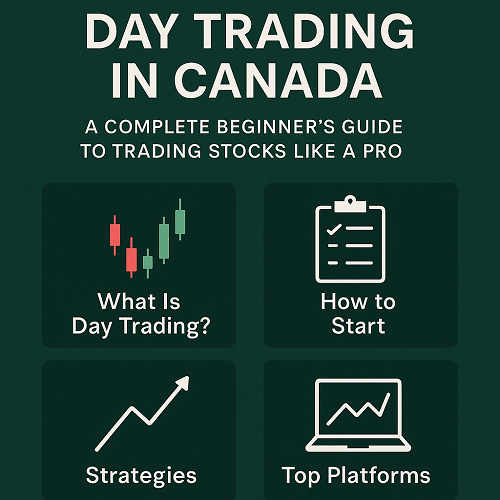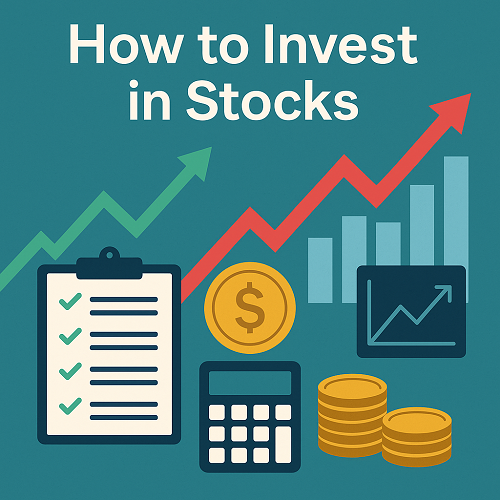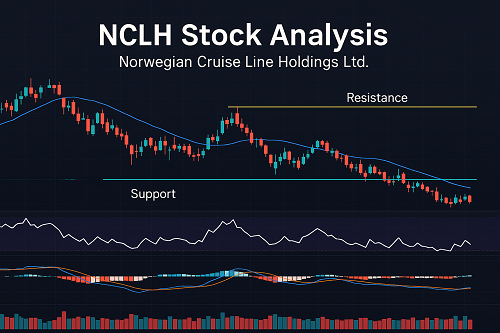Day trading has captured the imagination of thousands of Canadians seeking financial freedom, flexibility, and control over their investments. For those looking at day trading for beginners, the idea is simple — buy and sell stocks within the same trading day to capture small price movements. The execution, however, requires skill, discipline, and the right strategy.
This guide is designed to help Canadian beginners understand what day trading really is, how it works, what tools are needed, and how to get started safely. By the end, you’ll know how to approach day trading with confidence — without falling for common pitfalls.
What Is Day Trading?
Day trading is the practice of buying and selling a financial instrument — typically stocks, ETFs, forex, or crypto — within the same trading day. The goal is to profit from short-term price fluctuations.
Unlike long-term investing, where you hold positions for months or years, day traders close all positions before the market closes to avoid overnight risk.
Key Characteristics
- Short holding period: All trades are opened and closed on the same day.
- High activity level: Traders may execute several trades per day.
- Focus on volatility: Day traders thrive on price movement and liquidity.
Why Canadians Are Interested in Day Trading
The growth of commission-free trading apps and real-time market access has made day trading more accessible than ever for Canadians. The combination of flexible work, digital tools, and the appeal of controlling one’s own money has led to a sharp increase in retail trading participation.
Canadians are drawn to day trading for reasons such as:
- The potential for daily profits without long-term commitments.
- The freedom and independence of being your own boss.
- The thrill of participating in real-time market dynamics.
- The rise of educational resources and simulators to practice trading.
However, it’s crucial to remember that while the rewards can be high, the risks are equally significant — and most beginners lose money before finding consistency.
How the Canadian Stock Market Works for Day Traders
The main marketplace for Canadian equities is the Toronto Stock Exchange (TSX), home to major companies like Shopify, RBC, and Enbridge. The TSX Venture Exchange (TSXV) caters to smaller, emerging companies.
Canadian traders can also trade U.S. markets, such as the NYSE and NASDAQ, through brokers that offer dual-currency accounts. This access provides thousands of trading opportunities daily.
Trading Hours
- TSX / TSXV: 9:30 a.m. – 4:00 p.m. ET (Monday to Friday)
- Pre-market and after-hours trading may be available on select platforms.
Essential Tools for Day Trading in Canada
A Reliable Brokerage Platform
A trading platform is your most critical tool. Look for one that offers:
- Real-time quotes and data
- Low or zero commissions
- Advanced charting tools
- Fast order execution
Popular Platforms in Canada
| Platform | Best For | Highlights |
|---|---|---|
| TD Direct Investing | Integrated banking & investing | Excellent reliability, professional tools |
| Questrade | Low fees, active traders | Great balance between cost and features |
| Wealthsimple Trade | Beginners | Commission-free trading, user-friendly mobile app |
| Interactive Brokers Canada | Advanced traders | Global market access, pro-grade analytics |
Charting and Analysis Tools
Most day traders rely on technical analysis — reading price charts and using indicators to predict movement.
Common tools include:
- TradingView – advanced charts, community scripts, screeners
- MetaTrader 5 – powerful for forex and CFD trading
- ThinkorSwim – TD’s professional-grade analytics platform
News and Research Sources
Markets move on information. Stay updated through:
- Bloomberg, Reuters, MarketWatch for financial news
- Yahoo Finance and Morningstar for company data
- SEDAR+ for official Canadian filings
How to Start Day Trading in Canada: Step-by-Step
Step 1: Learn the Basics
Understand how orders, spreads, volume, and volatility work. Study technical indicators like moving averages, RSI, and support/resistance zones.
Step 2: Open a Brokerage Account
Choose a regulated Canadian broker that fits your experience level. Ensure it’s IIROC-regulated and CIPF-insured for protection.
Step 3: Fund Your Account
Most brokers require a minimum deposit (typically $1,000–$5,000). Make sure you have risk capital — money you can afford to lose.
Step 4: Practice with a Demo Account
Before trading real money, use a simulator or paper trading feature to build experience and test your strategy.
Step 5: Develop a Trading Plan
Define:
- Your entry and exit strategy
- Risk tolerance (e.g., max 1% loss per trade)
- Daily profit/loss limits
- Time commitment
Step 6: Start Small and Scale Gradually
Begin with small positions to learn without emotional pressure. Focus on consistency over profit.
Common Day Trading Strategies for Beginners
1. Momentum Trading
Buy stocks that are moving strongly in one direction with high volume. Ideal for volatile markets.
2. Breakout Trading
Identify key resistance or support levels. Enter when the price breaks out of these zones with volume confirmation.
3. Scalping
Make many small trades aiming for tiny profits. Requires excellent execution speed and discipline.
4. Mean Reversion
Bet on prices returning to their average after sharp moves. Works best in stable markets.
Risk Management: The Key to Survival
Even the best strategies fail without solid risk management.
Follow these golden rules:
- Never risk more than 1–2% of your capital per trade.
- Use stop-loss orders to limit downside.
- Avoid overtrading — stick to quality setups.
- Keep a trading journal to track decisions and learn from mistakes.
Understanding Taxes and Regulations for Canadian Day Traders
In Canada, day trading income may be taxed differently depending on whether it’s considered business income or capital gains.
- If trading is occasional or hobby-based, profits may qualify as capital gains (50% taxable).
- If it’s frequent and systematic, the CRA may treat it as business income (100% taxable).
Always consult a qualified tax professional for personalized advice.
Legal and Regulatory Notes
- Ensure your broker is registered with the Investment Industry Regulatory Organization of Canada (IIROC).
- Avoid offshore or unregulated brokers.
- Understand short-selling and margin trading rules before using leverage.
Psychological Side of Day Trading
Emotions often determine success more than skill.
Beginners must learn to control:
- Fear and greed during volatile swings.
- Overconfidence after winning streaks.
- Frustration after losses.
Develop emotional discipline by following your trading plan and taking regular breaks.
Advantages and Disadvantages of Day Trading
✅ Advantages
- Quick feedback and daily profit potential.
- No overnight risk exposure.
- High autonomy — you control every decision.
⚠️ Disadvantages
- High stress and emotional pressure.
- Time-intensive — requires full-day attention.
- Significant learning curve and financial risk.
Beginner Tips for Success
- Start small, think long-term.
- Keep learning: Study charts, books, and mentors.
- Use technology: Alerts, scanners, and automations help spot setups.
- Network with others: Join trading communities and forums.
- Never trade on emotion or FOMO.
The Future of Day Trading in Canada
With advancing technology, algorithmic tools, and more affordable platforms, Canadian traders now have access to institutional-grade resources. The trend toward AI-assisted analysis, fractional shares, and education-driven trading communities will continue to make day trading more accessible — but also more competitive.
Success in this environment will depend less on luck and more on preparation, discipline, and constant learning.
Conclusion: Start Smart, Trade Safe
Day trading in Canada offers exciting opportunities — but only for those who approach it with knowledge, structure, and patience. Start small, focus on learning, and treat it like a professional business.
Ready to begin your day trading journey?
Practice first, study daily, and choose a trusted IIROC-regulated broker to get started the right way.
When done right, day trading can be a rewarding pursuit that sharpens both your financial and psychological discipline.
Suggested Keywords (for SEO metadata)
- day trading in Canada
- how to start day trading
- beginner day trading guide
- best day trading platforms Canada
- day trading taxes Canada
- day trading strategies for beginners





 XAUT-USD
XAUT-USD AMD
AMD MARA
MARA SHOP
SHOP BULL
BULL CL=F
CL=F